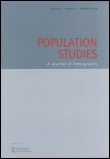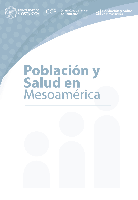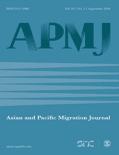
Demografie
Scope & Guideline
Advancing insights into population dynamics and trends.
Introduction
Aims and Scopes
- Population Ageing:
Research on demographic ageing, including indicators and trends, particularly in Central European contexts such as Czechia and Slovakia. - Family and Household Dynamics:
Studies exploring familial structures, marriage, cohabitation, and parenting, reflecting changing societal norms and policies. - Migration Patterns:
Analysis of internal and external migration trends, focusing on integration issues and the socio-economic impacts of migration. - Health and Mortality:
Investigations into health outcomes, mortality rates, and the socio-economic factors influencing these dynamics. - Statistical Methods in Demography:
Utilization of advanced statistical techniques and administrative data sources to analyze demographic phenomena and improve census methodologies.
Trending and Emerging
- Impact of COVID-19 on Demography:
Research focusing on how the pandemic has influenced fertility rates, family dynamics, and health outcomes, highlighting the need for adaptive demographic analyses. - Socioeconomic Factors and Health:
An increasing focus on how socioeconomic status affects health outcomes, particularly among vulnerable populations, is gaining traction in recent studies. - Integration of Immigrant Populations:
Emerging studies on the integration of ethnic and immigrant communities are becoming prominent, reflecting contemporary demographic challenges and policies. - Technological Advances in Data Collection:
The incorporation of new technologies and methods for data collection and analysis, especially in the context of the census and demographic surveys, is trending.
Declining or Waning
- Historical Demography:
There has been a noticeable decrease in papers focusing on historical demographic events, as contemporary issues take precedence in research agendas. - Cross-National Comparisons:
Research comparing demographic trends across multiple countries has waned, possibly due to a more localized focus on national and regional studies. - Theoretical Demographic Models:
The use of purely theoretical models without empirical data appears to be less common, as researchers increasingly favor data-driven approaches.
Similar Journals

POPULATION STUDIES-A JOURNAL OF DEMOGRAPHY
Navigating the Intersections of Population Studies and HistoryPopulation Studies: A Journal of Demography is an esteemed scholarly publication dedicated to advancing the understanding of demographic trends and their historical contexts. Published by Routledge Journals, Taylor & Francis Ltd, this journal has a notable impact in its field, recognized as a Q1 category journal in both Demography and History as of 2023. Its Scopus rankings highlight its significance, featuring a remarkable 12th place rank in Arts and Humanities—History and 19th place in Social Sciences—Demography, both underscoring its influential role in academic research. Established in 1947, the journal has consistently contributed to the discourse in population studies, offering a platform for innovative research and critical analysis. While it does not provide open access options, it remains a vital resource for researchers, professionals, and students who seek to explore the complex relationships between population dynamics and historical narratives. Its comprehensive coverage from 1947 to 2024 ensures a rich repository of knowledge, making it essential for anyone involved in demographic research.

DEMOGRAPHY
Transforming demographics into actionable knowledge.DEMOGRAPHY is a prestigious, peer-reviewed journal published by DUKE UNIVERSITY PRESS, dedicated to advancing the field of demography through scholarly research and critical discourse. With an esteemed Q1 ranking in Social Sciences and an impressive Scopus rank of #10 out of 139 in the category, this journal holds a 93rd percentile status, reflecting its significant impact on the academic community. Covering a wide range of topics related to population studies, including fertility, mortality, migration, and demographic change, DEMOGRAPHY serves as a vital resource for researchers, professionals, and students alike. Since its inception in 1964, it has provided a platform for innovative studies and influential articles that address both theoretical frameworks and applied research. Although not an open-access journal, it ensures that its contributions reach a global audience while maintaining rigorous academic standards. Engage with DEMOGRAPHY to explore and contribute to the dynamic discussions shaping our understanding of human populations in a complex world.

Canadian Studies in Population
Connecting History with Population InsightsCanadian Studies in Population, published by Springer, is a prestigious journal dedicated to advancing the field of demography and the history of population studies within Canada and beyond. With an ISSN of 0380-1489 and an E-ISSN of 1927-629X, this journal has proudly contributed to scholarly discourse since its inception in 1975, and continues to make significant impacts through its rigorous research articles and comprehensive reviews. Recognized for its high academic standards, it boasts a Q2 ranking in Demography and a Q1 ranking in History in 2023, reflecting the journal's critical role in shaping contemporary understanding of demographic trends and historical population developments. With a Scopus rank of #51/139 in Demography and #83/1760 in History, it appeals to a diverse audience including researchers, professionals, and students eager to explore population dynamics, historical context, and societal implications of demographic shifts. While the journal maintains traditional subscription access options, its rigorous peer-reviewed content ensures that it remains a cornerstone for scholars seeking credible and influential insights in their respective fields.

Poblacion y Salud en Mesoamerica
Empowering Research in Demography and Public HealthPoblacion y Salud en Mesoamerica is a pivotal open-access journal published by the University of Costa Rica's Centro Centroamericano Poblacion. With an ISSN of 1659-0201 and an E-ISSN of the same, this journal has been dedicated since 2003 to advancing the fields of demography, epidemiology, health informatics, and public health within the Mesoamerican region. Addressing critical health and population issues, it aims to foster a deeper understanding of demographic trends and their implications on health policies. As of 2023, the journal ranks in the Q4 quartile across several categories, reflecting its commitment to publishing quality research while serving as a platform for emerging scholars and seasoned professionals alike. Although it is currently in the lower quartile ranks, the journal seeks to establish itself as a vital resource in the context of Mesoamerican social sciences and health, making it an essential tool for researchers and practitioners interested in regional population health dynamics. Its editorial board is comprised of experts dedicated to enhancing the scholarly conversation surrounding population health and policy in Central America.

Journal of Population Ageing
Navigating the Complexities of Demographic ChangeThe Journal of Population Ageing, published by SPRINGER INT PUBL AG, stands as a prominent platform for the exploration and dissemination of research within the fields of demography, geography, and sociology. With an ISSN of 1874-7884 and an E-ISSN of 1874-7876, this journal navigates the complexities of population ageing, a vital topic as societies worldwide confront the implications of an ageing demographic. The journal boasts impressive Scopus rankings, including the 30th rank in Demography and a 78th percentile in Sociology and Political Science, emphasizing its significant role in academic discourse. It is highly regarded in its Q2 category quartiles for Demography, Geography, Planning and Development, and Sociology and Political Science, showcasing its relevance and scholarly impact. Although not an open-access publication, the journal's carefully curated articles aim to inform and advance knowledge, making it an invaluable resource for researchers, professionals, and students invested in understanding the multifaceted challenges associated with an ageing population. With its comprehensive scope and commitment to quality, the Journal of Population Ageing continues to contribute meaningfully to the evolving conversation on demographic trends and their societal implications.

Journal of Demographic Economics
Empowering Research Through Open Access ScholarshipThe Journal of Demographic Economics, published by Cambridge University Press, stands as a leading interdisciplinary platform dedicated to the exploration and advancement of research in the intertwined fields of demography, economics, and geography. With an impact factor that reflects its esteemed position—ranking in the Q1 quartile for Demography (2023)—the journal fosters scholarly dialogue through high-quality articles that elucidate the complex interactions between population dynamics and economic trends. Operating under an open access model, the journal ensures that its findings are widely accessible, promoting inclusivity and engagement among researchers, professionals, and students alike. The Journal of Demographic Economics endeavors to bridge gaps in knowledge by publishing innovative and rigorous studies, thereby contributing significantly to both theoretical frameworks and practical applications across various domains. Drawing submissions from a global audience, this journal not only enhances the understanding of demographic transitions but also informs policy decisions and socioeconomic development strategies, making it an essential resource for those invested in demographic and economic research.

JOURNAL OF POPULATION ECONOMICS
Pioneering Research at the Intersection of Demography and EconomicsThe JOURNAL OF POPULATION ECONOMICS, published by SPRINGER, stands as a leading peer-reviewed journal in the fields of demography and economics. Established in 1988, this esteemed journal offers a platform for high-quality research that probes the intricate relationships between population dynamics and economic phenomena. With its impressive Q1 quartile ranking in both Demography and Economics and Econometrics for 2023, the journal is recognized as a vital resource for scholars and practitioners alike, reflecting its rigorous standards and impact in the academic community. Its Scopus rankings position it within the top tiers of social sciences, making it an essential read for those engaged in demographic and economic research. Although the journal does not currently adopt an open access model, its esteemed reputation and continuous publication until 2024 ensure relevant and up-to-date findings contribute meaningfully to scholarly discourse. At its core, the JOURNAL OF POPULATION ECONOMICS aims to bridge theoretical insights and empirical findings, fostering an understanding of how population changes influence economic outcomes and vice versa.

Asian and Pacific Migration Journal
Elevating voices in the study of migration patterns.The Asian and Pacific Migration Journal is a premier scholarly publication dedicated to the critical examination of migration issues within the Asian and Pacific regions. Published by SAGE PUBLICATIONS LTD, this journal has played a pivotal role in advancing knowledge and understanding in the fields of demography and geography, evidenced by its recognition in the 2023 Category Quartiles as Q2 in Demography and Q3 in Geography, Planning and Development. Since its inception in 1992, the journal has sustained a commitment to providing high-quality, peer-reviewed articles that engage with contemporary migration challenges and trends, making it essential reading for researchers, professionals, and students alike. Although not open access, the journal continues to maintain a respectable Scopus rank in the social sciences, making significant contributions to academic discourse. As it moves towards 2024, the journal remains a vital resource for those seeking to deepen their understanding of migration dynamics in these critical regions.

Novedades en Poblacion
Exploring the Dynamics of Population ChangeNovedades en Poblacion is a pivotal academic journal dedicated to the interdisciplinary exploration of demographic studies, population policies, and social dynamics, published by UNIV HABANA. Since its inception in 2005, this open access journal has provided a platform for researchers, professionals, and students to disseminate and discuss cutting-edge research and findings relevant to populations in Latin America and beyond. With a commitment to high-quality scholarship, Novedades en Poblacion plays a vital role in contributing to the global conversation on demographic changes, migration patterns, and socio-economic impacts on populations. Researchers are encouraged to submit original articles, reviews, and studies that advance the understanding of demographic issues, making it an essential resource for those engaged in the fields of sociology, public health, and urban studies.

Comparative Population Studies
Empowering researchers with open access to demographic knowledge.Comparative Population Studies is an esteemed open-access journal published by the BUNDESINSTITUT BEVOELKERUNGSFORSCHUNG in Germany, dedicated to advancing the field of demography. Since its launch and transition to open access in 2010, the journal has provided a platform for researchers to share innovative population studies, promoting a deeper understanding of demographic trends and patterns globally. With an impressive Q2 rank in Demography within the 2023 quartile categories and a commendable rank #61 out of 139 in Scopus' Social Sciences Demography classification, it plays a vital role in disseminating rigorous research. The journal covers a range of topics related to population dynamics, migration, and social implications, making it invaluable to academics, professionals, and students in the field. With an emphasis on comparative studies, Comparative Population Studies not only fosters scholarly dialogue but also enhances policy-making and economic planning. Located at Friedrich-Ebert-Allee 4, Wiesbaden 65185, Germany, the journal continues to be a prominent resource for those eager to engage with the latest demographic research.